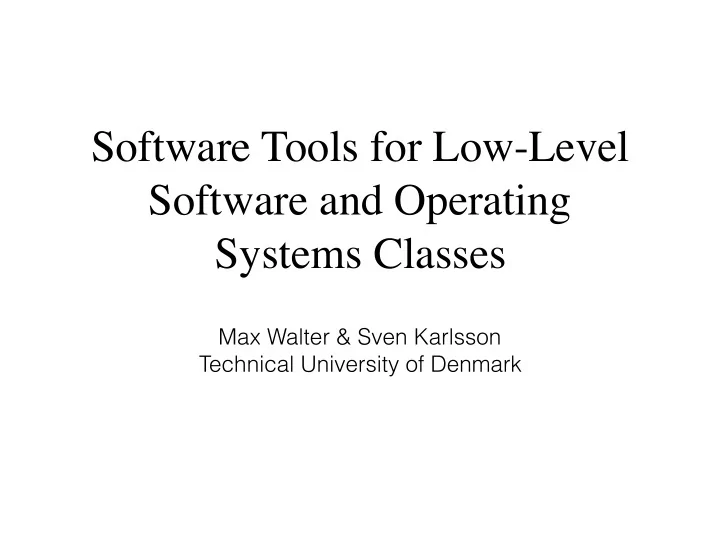

Software Tools for Low-Level Software and Operating Systems Classes Max Walter & Sven Karlsson Technical University of Denmark
Introduction • I have been involved in a number of classes • Real Time and Embedded Systems • Introduction to Operating Systems • Computer Organization and Assembly • A common theme: Hardware from a software perspective
Introduction • I have been involved in a number of classes • Real Time and Embedded Systems • Introduction to Operating Systems • Computer Organization and Assembly • The common theme: Hardware from a software perspective
That Being Said • These are the first architecture classes students take • May be the last • Introductory computer science becoming increasingly higher level • Why not introductory computer science architecture?
Outline • Motivation • How to increase intuitive understanding • Virtualization as a platform • Our solution • Examples
The Common Theme • Some software development requires (some) architectural knowledge • Operating systems / Device Drivers • Timing / performance critical code • Compilers • Bare-metal software • Etc…
Does Anyone Do That Anymore? • Yes, and it is becoming increasingly important
Does Anyone Do That Anymore? • Operating Systems • Multi- / Many- Core • Accelerators • “The Machine”
Does Anyone Do That Anymore? • Embedded Systems • Increasingly capable mobile devices • Massive proliferation of embedded devices with “Onboard Processing” • IoT / Cyber Physical Systems
And Yet • Many universities are moving introductory classes to higher level languages • Matlab • Java • Python Guo, Philip. "Python is Now the Most Popular Introductory Teaching Language at Top US Universities (2014)." Communications in ACM, Blogs (2015).
This Isn’t a Bad Thing • It reflects the current nature of computer science education • Algorithms and concepts over details x = “hello” char *x = “hello”; y = “world” char *y = “world”; z = x + “ “ + y char *z = malloc(strlen(x) + print z strlen(y) + 2); strcpy(z, x); strcat(z, “ “); strcat(z, y); printf(“%s\n”, z); free(z);
This Isn’t a Bad Thing • It reflects the current trends of commercial programming • App market grossed $44.8 billion in 2016 1 WWDC 2013 1) new zoo global market report
But Abstractions Matter • Hardware is treated to be a black box • It exists just to run code • Sometimes you have to deal with it
But Abstractions Matter • In these classes we have to lose the abstractions • Stack, heap, busses, interrupts, traps, assembly, DMA, processes, virtual and physical memory, cache sizes, memory hierarchy, instruction latencies, scheduling, etc… • They all matter
How to Increase Conceptual Level • We want to decrease difficulty curve • Better tools • Better visualization
First Step • Simply integrating Bochs and Eclipse • Not unheard of • Can we do the same for an OS class • Need lower level access than what these tools provide • Yes
First Step • Simply integrating Bochs and Eclipse • Not unheard of • Need lower level access than what these tools provide • No user-space to run the debugger • Yes
First Step •
First Step •
First Step • So simple; trite even • Surprisingly so
Can We Do Better? • There are so many tools that could be useful • Profilers • Tracing tools • Visualization tools • Instrumentation Frameworks
Can We Do Better? • Virtual execution environments have a lot to offer • They expose the entire hardware platform • Provide higher level access so we don’t have to focus on details • empty
Virtualization is Used Extensively • But as a tool, not as a platform
A Framework for Exposing Virtualization Internals • Started out as a way to test our kernel • Combined with tools and assignments from past classes
A Framework for Exposing Virtualization Internals
Create a Way to Expose the Internals • What do we want access to? • Exceptions and Interrupts • System calls • Physical / virtual memory, page tables • To start — The sky’s the limit
Create a Way to Expose the Internals • What do we want access to? • Exceptions and Interrupts • System calls • Physical / virtual memory, page tables • To start
What Do We Build On? • Bochs? • QEMU? • gem5? • Xen? • Our own? • No good answer
What Can/Have We Done With It • Very much a work in progress
Samples • Multitasking • Cooperative and preemptive
Samples
Samples
Samples
Samples
Work In Progress • Need a proper visualization system • Wanted to expose AXI bus signals • Need a way to record/playback • Need custom IP • Need a better way to find and match symbols
Conclusions • Introductory computer science is moving to a higher level • And will continue to do so • Introductory architecture can as well • Still lots of questions
Recommend
More recommend